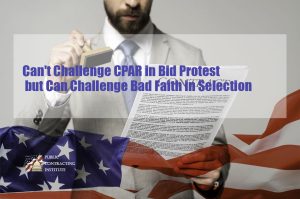The Court of Federal Claims recently held that it could not consider a post-award bid protest of a Contractor Performance Assessment Report (“CPAR”); however, it could consider the bad faith actions of the agency which allegedly compromised the award of the contract at isue. Colonna’s Shipyard, Inc. v. United States, No. 19-1373C (Fed. Claims Jan. 21, 2020). The issue was whether the company could challenge a CPAR while protesting the award of a different contract, i.e. not the one on which the CPAR had been issued.

The Navy made award to a competitor for phased maintenance on the Naval Ship Prevail. In its evaluation of offers, the Navy relied on a CPAR issued as a result of Colonna’s maintenance on the Naval Ship Narragansett, under a previous contract. Colonna asserted that the CPAR was neither factual nor correct, and that the CPAR had directly caused the Navy to reject Colonna’s bid on the Prevail Contract—on which Colonna was entitled to award. Colonna contested the CPAR but the Navy denied its claim. It is important that Colonna filed two actions: (1) a Contract Disputes Act (“CDA”) claim case concerning the CPAR, and (2) the instant bid protest in the Court of Federal Claims.
Colonna asserted in the bid protest case that the Court should cause the CPAR to be corrected because it had caused Colonna to lose the Prevail contract and would likely cause it to continue losing contracts. The Court disagreed, and dismissed this count in the protest because of the ruling in Bannum v. United States, 404 F.3d 1346 (Fed. Cir. 2005), which held that a bid protest was not a proper forum to litigate performance assessments received by offerors for its performance on a different contract. Bannum applied here, and the Court held that Colonna’s challenge to the CPAR on the Narragansett Contract was not within the Court’s jurisdiction for a challenge to the award of the Prevail contract.
However, the court refused to dismiss Colonna’s other count in the complaint which alleged bad faith on the part of the Navy in the issuance of the CPAR, and in the use of that CPAR in the award of the Prevail contract. Colonna stated that the CPAR was misleading and inaccurate, and that inclusion of such information was done “in bad faith to preserve the reputation of [Navy] personnel and to shift the blame for all contract problems to the contractor.” The Court noted that allegations of bad faith conduct in the selection of an awardee were not outside of the court’s bid protest jurisdiction, as long as the focus is on bad faith actions which compromised the award of the Prevail contract, rather than bad faith actions related to the issuance of the CPAR.
Takeaway: Although you cannot challenge a CPAR while protesting the award of a different contract, i.e. not the one on which the CPAR had been issued, you can challenge bad faith actions in the selection which compromised the selection in the protested procurement. You should be challenging the CPAR in a CDA claim and appeal, separately from any bid protest (something that Colonna was doing in addition to filing the bid protest).
For other helpful suggestions on government contracting, visit:
Richard D. Lieberman’s FAR Consulting & Training at https://www.richarddlieberman.com/, and Mistakes in Government Contracting at https://richarddlieberman.wixsite.com/mistakes.
